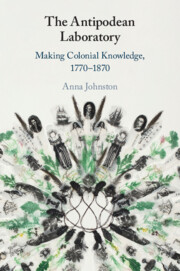Book contents
- The Antipodean Laboratory
- The Antipodean Laboratory
- Copyright page
- Dedication
- Contents
- Figures
- Acknowledgements
- Note on the Text
- Introduction
- Part I Imagining Settler Humanitarianism
- Part II Regulating Settler Society
- 3 Virtuous Curiosity
- 4 Prison Letters
- Part III Inventing Settler Science
- Bibliography
- Index
4 - Prison Letters
Reading and Writing from Norfolk Island, 1834–1860
from Part II - Regulating Settler Society
Published online by Cambridge University Press: 21 September 2023
- The Antipodean Laboratory
- The Antipodean Laboratory
- Copyright page
- Dedication
- Contents
- Figures
- Acknowledgements
- Note on the Text
- Introduction
- Part I Imagining Settler Humanitarianism
- Part II Regulating Settler Society
- 3 Virtuous Curiosity
- 4 Prison Letters
- Part III Inventing Settler Science
- Bibliography
- Index
Summary
This chapter analyses the diverse textual sources emanating from Norfolk Island, which were captured in colonial and imperial archives, to explore how metropolitan ideas could be trialled in remote colonial Australian locales, brought into metropolitan inquiries, then circulated through imperial print culture. Ambitious and curious men such as Alexander Maconochie saw the Australian colonies as opportunities for personal advancement and intellectual endeavour. He experimented with prison reform in Tasmania, then was appointed as Commandant at Norfolk Island, where he both implemented and wrote his new ‘mark system’ of prison management. On his return to Britain, Maconochie produced multiple publications promoting his scheme. He appeared before governmental inquiries to defend his reputation and extend his influence; and in so doing inaugurated many of the foundational modern principles of penology. Maconochie also encouraged prisoners to write, and thus a rich archive of convict memoirs emerged from Norfolk Island, including those by James Lawrence and William Henry Barber. These connected with progressive publishers, such as Thomas Chambers, and writers such as Charles Dickens, who included convict voices and narratives in their metropolitan publications and built public support for the end of transportation.
Keywords
- Type
- Chapter
- Information
- The Antipodean LaboratoryMaking Colonial Knowledge, 1770–1870, pp. 147 - 178Publisher: Cambridge University PressPrint publication year: 2023

